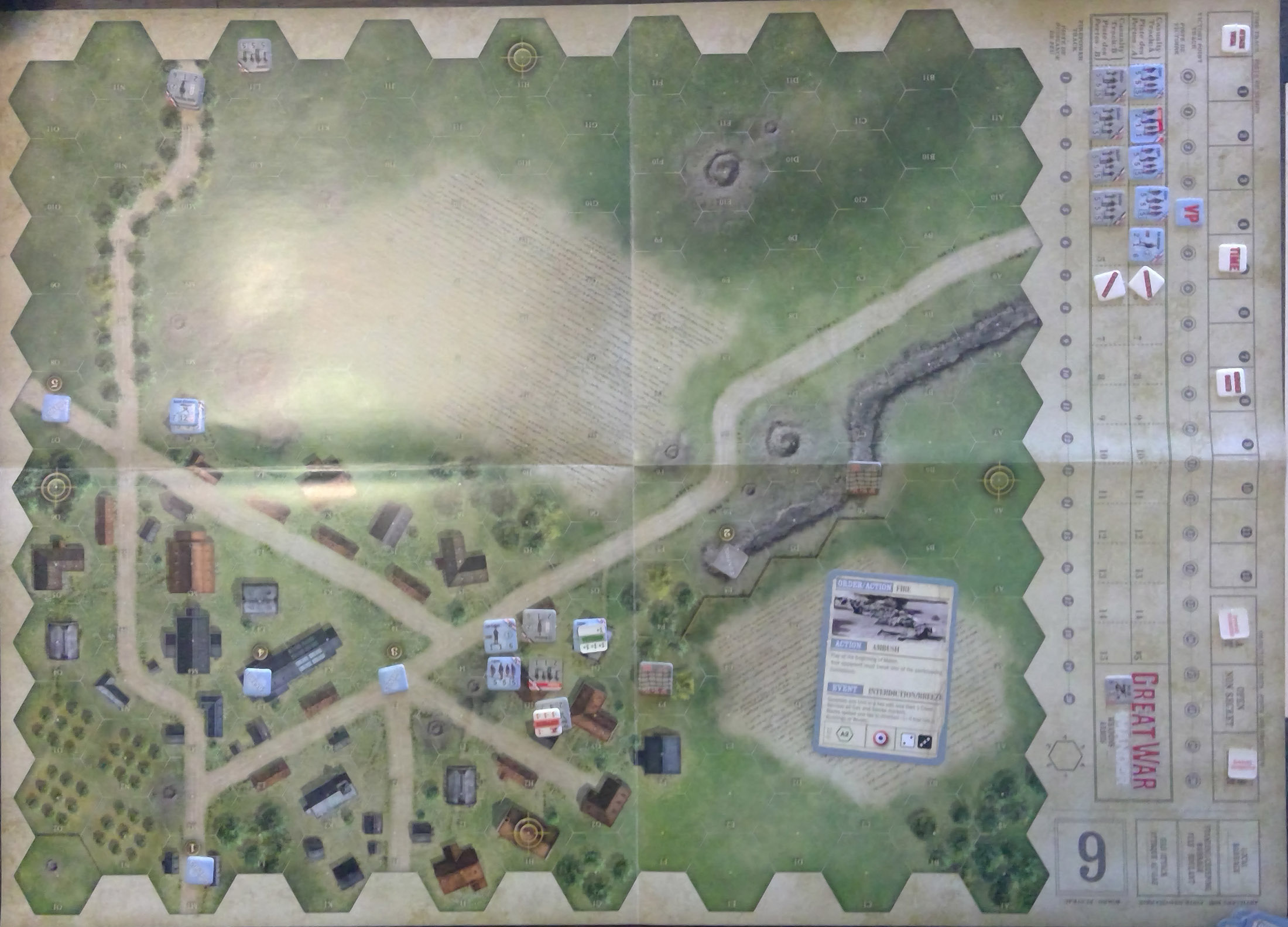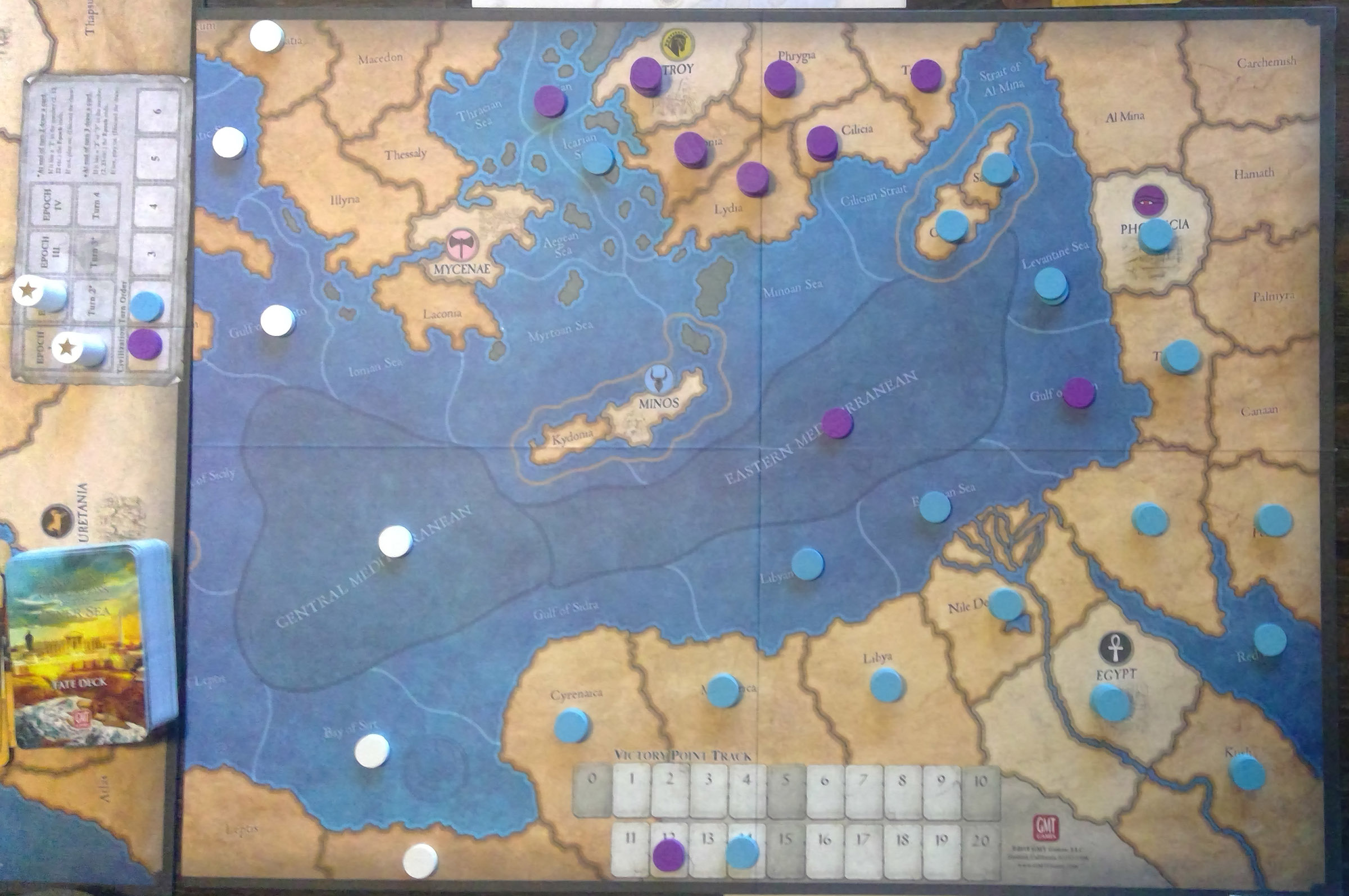Great War of the Inner Sea
Mark finally got back in contact, and we had a 2-player day on September 28th. It was his ‘pick’ on our schedule, and his primary desire was to try out Great War Commander. It’s a WWI variant of the Combat Commander series done by Hexasim. I’ve never done anything with that system, so I don’t know how close the two are, but going through the rulebook ahead of time had me pretty lost, as I wasn’t able to hold the general shape of the system in my head.
Naturally, actually playing the game was a lot better. We did the first scenario, with out the Strategic cards. I had the French, defending a small town in Belgium from an equal number of Germans at the beginning of the war. My Victory chit draw got me the side edge road, while Mark’s was in the center of town. The French setup is fixed, other than the position of the MG, which went near my VP area (which is where I was already thinking for it) as it had a decent field of fire from there (the field in the center cut off more than I expected), while Mark put most of his troops on the opposite side, and advanced to the trench outside of town. Two platoons went on the other side, and were successfully held off by the MG the entire game.
The first part of the game was pure frustration for me, as it is tough to have any effect on an opposing unit with individual fire, and when I did manage such a thing, Mark would play Recovery shortly thereafter, getting rid of the suppression markers, and very good odds to rally anyone who had broken. Thankfully, he took a while to manage anything against me, as I didn’t see more than one Recovery in the entire game, and, just like in Up Front, I saw entirely too few Move cards.
I did stymie Mark’s advance a little way in as I sprung some ‘hidden wire’ on him as his commander advanced up the trench, and his main group broke up in confusion. He recovered from that, but it took time and work. However, my initial outpost collapsed under his advance, and he got the first casualties as the time clock ticked forward. Shortly after Mark had gone through his deck the first time, we both got time advance rolls, which put some pressure on the Germans as my VPs moved up, and available time moved down.
But the Germans finally got to grips with more of the defenders, and eliminated my overall commander in a melee, though had at least taken some with me. In fact, casualties mounted up fast, including getting an event that eliminated another German platoon outright. We ended up with another set of melees, and I had to make some tough decisions on where to play my actions to shore them up. I picked well, losing one, but winning the other, taking out two German platoons with my remaining officer, and sending the Germans over the surrender limit.
It was a really dramatic finish, and a big turn around from the early-game helplessness of the French. We both had a few problems with the game (like overriding our ASL instincts that woods should follow art, and not be Inherent Terrain), and I have to wonder about the non-geomorphic maps that would seem to keep the scope of possible scenarios down. But its an entertaining system, and I’m certainly willing to see more of it.
After a late lunch, we broke out Ancient Civilizations of the Inner Sea, which Mark had recently gotten (after I had pointed it out to him) but hadn’t had a chance to look at yet. It’s a fairly simple and streamlined game, and we were able to get into the basic 2-player Egypt-Troy scenario and through the first Epoch with the available time from a standing start.
In some ways, it’s certainly no Civilization replacement, as you don’t have the real sense of building up from almost nothing (the 12- to 16-disk setups kind of rob you of some of that), and the lack of trade and advancements keep you from feeling like things are really changing. That said, it does seem to get a lot out of what it does have. We’ve barely scratched what the card deck has to offer, and didn’t get any chance at long-term conflict.
I got off to a strong start as Egypt, with VPs leaping up from plenty of cities. Of course, settlements are important too, and I ended up with too few of them, but I managed, with some help from Eygpt’s main power. Mark struggled a bit more, especially as the cards mostly aligned against him. Things went better for him on the third turn, and he caught up a bit, but I had settled Cyprus while he’d had trouble keeping a presence at any distance from Troy. I did denude my treasury on the last turn paying for keeping losses from affecting me. Neither of us got to building a wonder, as we were mostly looking at getting a handle on the main sequence of the game.
It looks like it will live up to its promise, and we will have to introduce it at a multiplayer day soon!



Discussion ¬